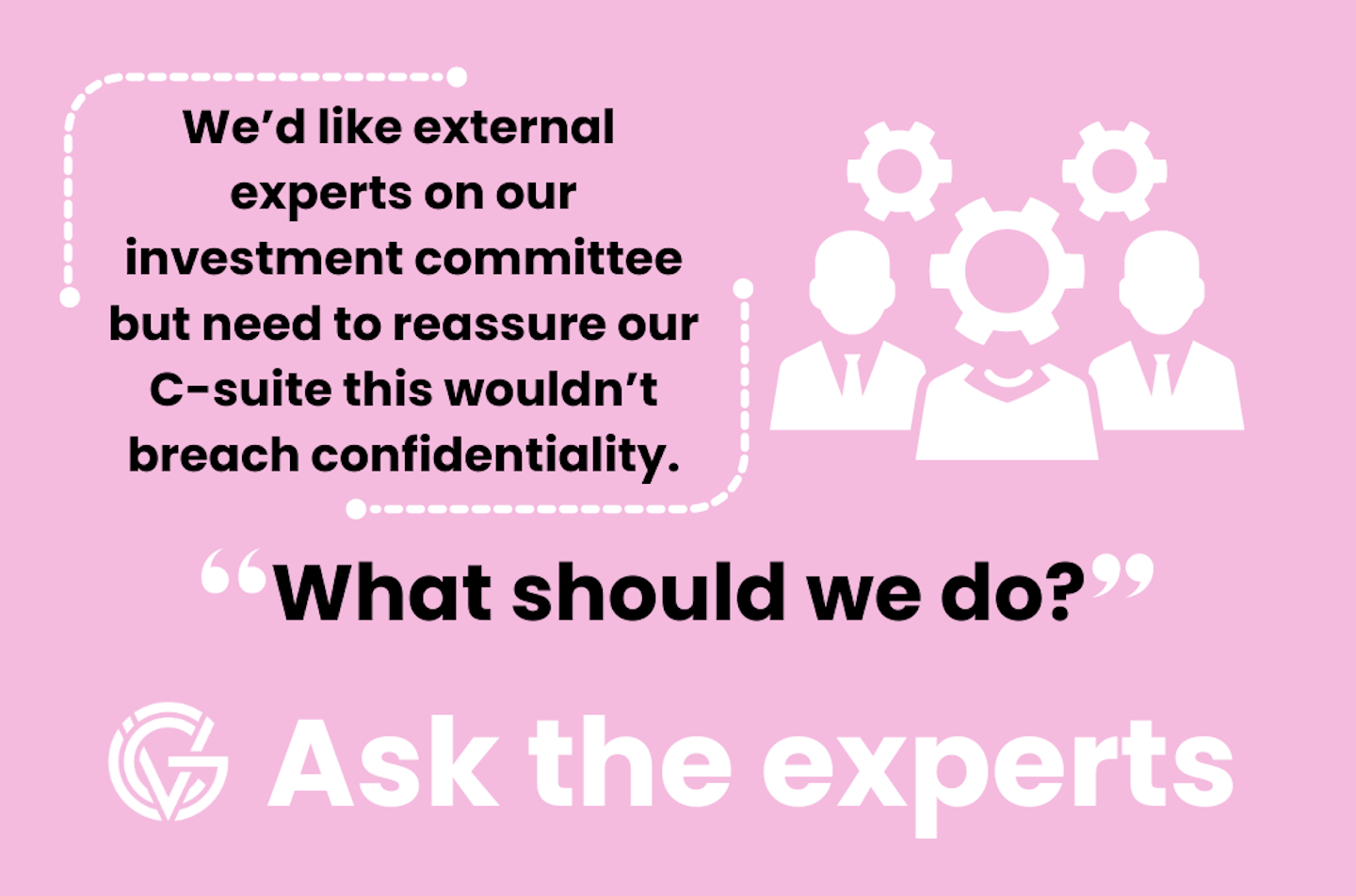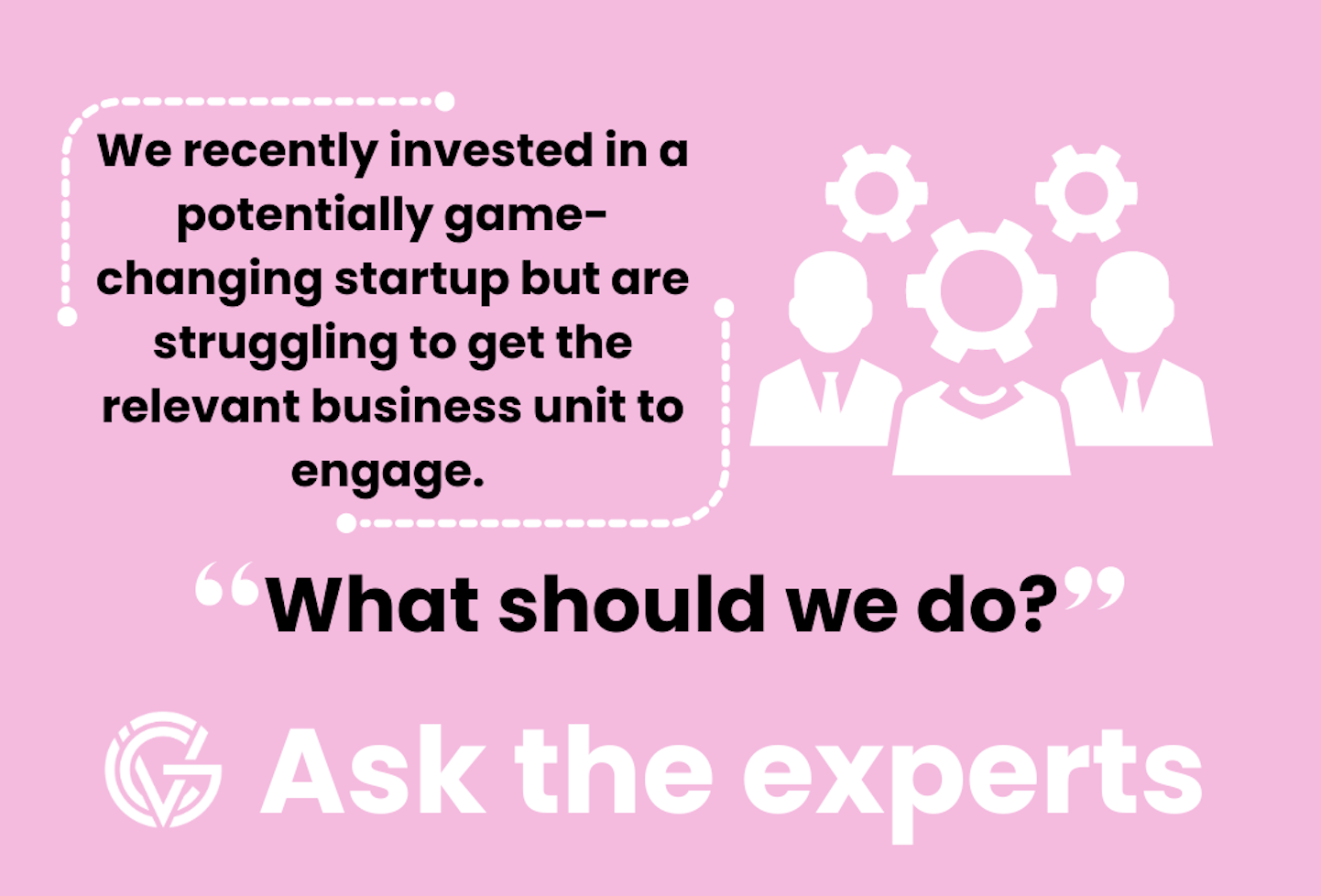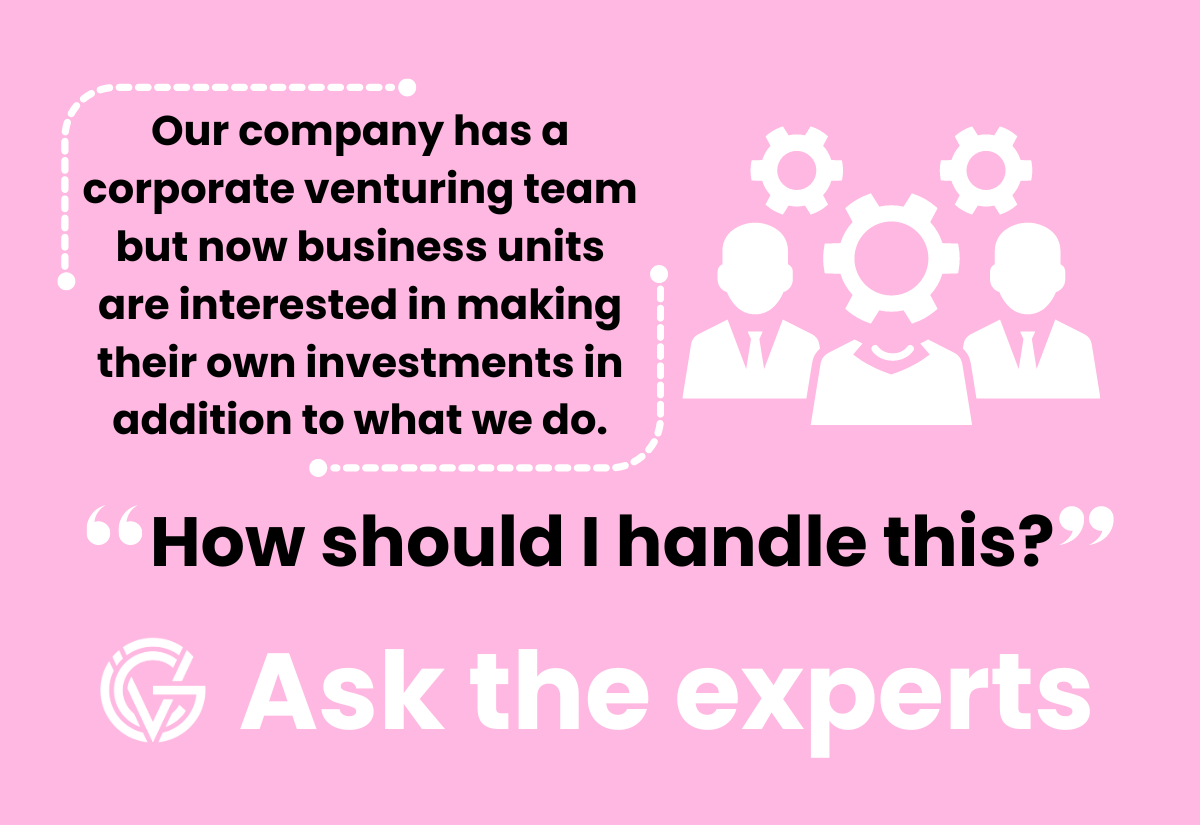
This is a monthly column in which readers can ask our network of experienced corporate venturing professionals about how to handle the common dilemmas of CVC practice.
If you would like to submit a question email us here.
The question:
“We’d like to involve some external experts on our investment committee, to bring in some outside perspectives. How can we reassure our parent corporation this wouldn’t breach internal security or confidentiality?”
The expert views:

JetBlue Ventures has had an external member of our investment committee since we were created in 2016. Most often the investment committee members who are part of your mothership are not experts in start-ups or venture investment so having another voice to support the work the team is doing is incredibly helpful.
“Having the voice of an external person who is an expert in the venture industry gives my investment committee confidence that our team is thinking about deal making in the right way.”
Start by finding someone who has experienced the path that you are on as an organisation and who can help you navigate obstacles to the firm’s future strategy. I find having the voice of an external person who is an expert in the venture industry gives my investment committee confidence that our team is thinking about deal making in the right way to be successful. This significantly enhances the decision-making process and is also a supporting voice when it comes to importance of supporting the portfolio companies.
It is also super helpful to have an experienced venture professional to go to for advice when needed. The most straightforward way to demonstrate information security to your parent company is to include confidentiality clauses in an investment committee charter and their individual investment committee agreement. Robust confidentiality policies and, when needed, bylaws will increase confidence that internal information will not be leaked.
While the external member will bring their own experience and perspective to the committee discussions, the work they are reviewing is centred around your firm. Position your external IC member as part of your team with the fiduciary responsibilities that go along with that to the organisation – not unlike a board director.

GCV Institute research over the past five years has shown that the majority of corporate executives do not understand how venture capital works, nor the potential role that a corporate venture capital can play in innovation strategy. Therefore, it can be very helpful to tap external resources with expertise in venture capital/CVC, startups, technology, emerging markets, and/or strategy.
But should they be in decision-making or advisory roles?
GCV Keystone’s latest CVC benchmarking data shows that 14% of CVCs now include external representatives, operating under NDAs, as independent voting members of their investment committees. The majority of these CVCs are programs which have significant operating autonomy and are investing beyond the scope of existing parent businesses, often called Horizon 2-3 investments.
“14% of CVCs now include external representatives on their investment committees.”
This disruptive innovation focus increases the value of external insight while reducing the risk of conflicts of interest with the parent corporation. But be aware that independent IC members may face potential bylaw limitations on serving or conflicts with their own organisations.
On the other hand, less than 5% of the CVCs that are investing more directly in support of existing parent businesses — so-called Horizon 1-2 investments — have external representatives as voting investment committee members.
This does not mean that these CVCs do not need external expertise; but it may be easier to build external input into investment strategy development and deal management and the due diligence process via a specialist advisory relationship, under a non-disclosure agreement.
In either case the primary goal remains to determine what external expertise is needed, and how it might best be applied for both executive education — particularly for executives on the investment committee — and effective investment decision making.

We often invite external perspectives from non-competitive organisations to vet cohorts – side-by-side with our clients. They often see the same challenge, but from a different perspective, and can help illuminate opportunities and gaps that your own investment committee may have missed.
Standard safeguards like non-disclosure agreements and limiting exposure to certain internal IP will reassure the corporation.
The purpose of this work is to think differently and having different thinkers disrupts the status quo. Standard safeguards like non-disclosure agreements, limiting exposure to certain internal IP to focus the external partners on the external opportunity will reassure the parent corporation that the benefits will outpace any perceived risks.

“Ultimately, corporate venture units are unique animals , within organisations that are also unique animals. The viewpoints on future strategy and visions may never be in alignment ever, despite having some common DNA. Bringing in outsiders might therefore upset the balance of the DNA further.
Thus, you may have to resign yourself to not being able to have outsiders on the investment committee. The most effective external investors, who really understand your organisational and innovation DNA — might only come from competitors, and that would not work for most businesses. Or you will have external advisers with portfolio careers, and there will always be a question over whether they have conflicts of interest.
“You may have to resign yourself to not being able to have outsiders on the investment committee.”
Ultimately, the choice of bringing in an outside expertise might depend on what your true “needs” are and not following a formulaic approach. This requires considerable thought and might depend on the phase or lifecycle of the activity.
One consistent observation I have – external voices can help support the culture of innovation to support CVC units. Many companies don’t understand the importance of building up that muscle, and running a CVC unit can be an uphill battle. The CVC head might need support in building this muscle and this is where externals can help. This might be a more important function than, say “teaching the CVC unit to do deals”.
Think about ways you could get this even without the outside advisor. Bring in allies from the business who can bring this kind of thinking — they may be a subject-matter expert from the business or others who understand your innovation goals, or working in close groups of innovators. I have found this community to be open and have similar challenges, and I meet very similar types of people too.“
Previously, on Ask the Experts:

You can’t force them to engage — but make sure you share success stories and play up on their fear of missing out.
Read the full advice from Gen Tsuchikawa, Sony Ventures; Crispin Leick, EnBW New Ventures; Liz Arrington, GCV Institute

If it’s a great investment , steal it. If it’s a terrible one, kill it. If it’s somewhere in the middle, be helpful and keep lines of responsibility clear.
Read the full advice from David Stevenson, MSD Global Health Innovation Fund, James Loftus, PayPal Ventures and Liz Arrington, GCV Institute.
